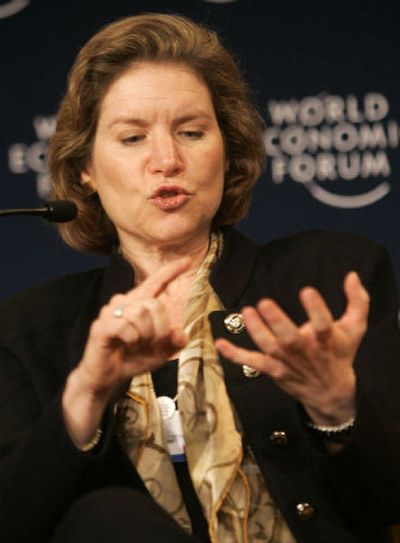Trade ministers look ready to talk

DAVOS, Switzerland – Previously dormant world trade talks showed signs of life Saturday, with trade negotiators from the United States, Europe and key developing countries willing to resume discussions on cutting agricultural subsidies by rich countries.
U.S. Trade Representative Susan Schwab told reporters she concluded the talks with a “sense of optimism” as well as a “sense of realism about all the hard work we have ahead of us.”
Brazilian Foreign Minister Celso Amorim said the talks carried “a clear sense of urgency, which perhaps wasn’t present before,” following the meeting on the sidelines of the World Economic Forum in the Swiss Alps.
The talks, which comprise the Doha Round of international trade negotiations, were suspended last July after the United States, the European Union and large developing countries – led by Brazil and India – failed to resolve differences over cuts in U.S. and European farm subsidies and access to agricultural and industrial markets in large developed countries.
Amorim said he hoped to see a “breakthrough” by March or April. Schwab said she hoped Amorim was correct.
Negotiators said the meeting Saturday and recent negotiations between small groups of negotiators haven’t focused on key numbers.
Trade ministers typically gather alongside the annual Davos retreat, which serves as an informal forum of discussion on political, economic and social topics and draws the elite of the world’s corporate and political leaders. This year’s event saw contrite CEOs promise to renew pressure on trade ministers to press for an agreement.
This annual Davos event is seen in part as a forum on the unalloyed benefits of globalization. Alarms were raised this year that failure of the Doha Round, which began in 2001 in Doha, Qatar, could nearly freeze efforts to significantly expand trade.
European Central Bank President Jean-Claude Trichet on Saturday morning, in a panel discussion, said growing intra- and extra-European trade would be endangered by the failure of the negotiations.
A rare voice of skepticism among the Davos crowd was heard from Nobel Prize-winning economist Joseph Stiglitz of Columbia University, who identified the perceived urgency of the negotiations as one of the biggest fallacies about globalization heard at Davos, according to a WEF summary of a Friday night event featuring Nobel winners.
“These frameworks don’t help poor countries,” Stiglitz said.
Amorim said he hoped to see a “breakthrough” by March or April. Schwab said she hoped Amorim was correct.